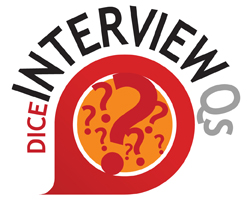Project manager is one of the hottest jobs on the planet. Since books and courses can’t begin to cover the challenges PMs encounter over the course of a project, IT directors prefer veterans who bring a wealth of knowledge and experience to the table.

“First and foremost, PMs are problem-solvers, and most problem-solving skills are developed through on-the-job experience,” says Cathlynn Carman, a freelance project manager and guide for the Dice Project Management Talent Community. “IT managers want to hear about the challenges you’ve faced, what you’ve learned and how you plan to leverage your cumulative experience to ensure consistent, on-time execution.” Carman provided some tips for you when sharing this list of
project manager interview questions and responses for PMs.
Which PM methodologies are you most familiar with?
- What Most People Say: “I’ve used Waterfall and Agile.”
- What You Should Say: “I’m familiar with several methodologies including Waterfall, Agile and Scrum. Most importantly, I’ve learned that each methodology has its pluses and minuses. That’s why I consider key aspects of the project, including the desired outcomes and the CIO’s preferences before selecting a methodology. Plus, I always evaluate the effectiveness of a methodology after every project. Let me give you a couple of recent examples.”
- Why You Should Say It: Veteran PMs tailor their methodologies, frameworks and processes toward the requirements, the needs of the team, company culture and so forth. In fact, they often mix and match portions of several methodologies to ensure optimal results. Inexperienced PMs often recite the Project Management Institute’s recommendations, Carman says. That forces the interviewer to ask follow-up questions.
“A short, textbook answer doesn’t invite discussion or build trust with the interviewer,” Carman observes. “An expanded answer engages the interviewer and showcases your experience and versatility, which are critical competencies for PMs. Even if you don’t have a lot of experience, you can still explain why a methodology is effective or ineffective and when they should be used.”
Describe a situation where you encountered a problematic team member and what you did about it.
- What Most People Say: “When I encounter someone who’s difficult to work with, or who constantly misses deadlines, I discuss the issues with them. If the problems persist, I go to their manager.”
- What You Should Say: The best way to illustrate your approach to problem-solving is by sharing an example. “I found out that a developer was unhappy and secretly sabotaging the project during his communications with the client. The client loved this developer, so I needed to find a way to resolve the issue without jeopardizing our client relationship. I communicated with the client while documenting his performance issues, which helped me save face with the client and replace the developer.”
- Why You Should Say It: People problems are rarely simple. Painting a picture for the interviewer highlights your ability to understand, navigate and favorably resolve complex problems.
Do you have experience managing a distributed team?
- What Most People Say: “Yes. I regularly communicate with team members located in Dallas, New York and India.”
- What You Should Say: “I have extensive experience managing global teams. Here’s how I make it work.” Or, “I haven’t managed a distributed team but I understand the challenges. Here’s how I would solve them.”
- Why You Should Say It: “Show how you solve problems by extrapolating experienced gained from one project to another,” Carman says. “Or, by demonstrating your understanding of the issues and a range of viable solutions, even if you don’t have hands-on experience.”
Why are you interested in working for XYZ and taking on this project?
- What Most People Say: “XYZ seems like a great company.”
- What You Should Say: “I’m interested in working for XYZ because of your commitment to sustainability. In fact, green IT is one of my passions and I employ environmentally sound techniques throughout each and every project. I view this project as an opportunity to improve XYZ’s business processes while pursing my interest in deploying green data.”
- Why You Should Say It: Convey your interest by digging into the company’s website and press releases and picking out something that appeals to you.
“A specific response shows that you care enough to do your homework and illustrates how you fit into the team,” Carman says. “No matter how much experience you have, you need to sell yourself during the interview if you want to land the job.”

